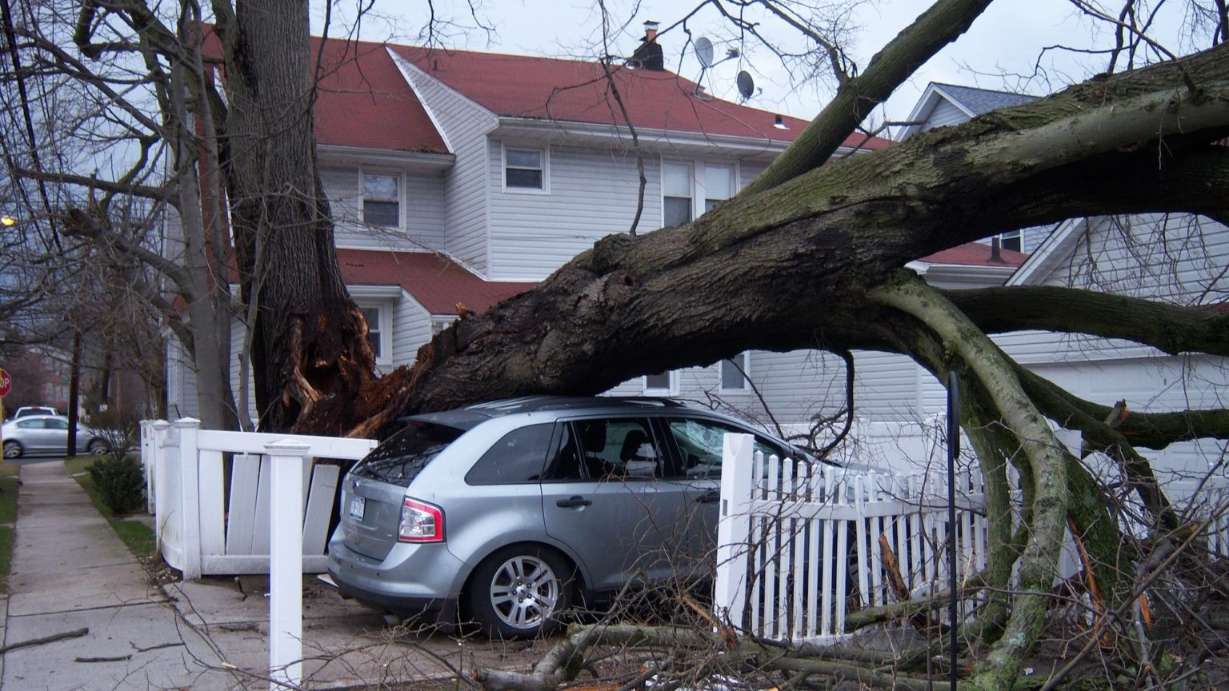Certain storm damage causes, such as wind, hail, and lightning, may be covered by homeowners’ insurance. Damage caused by floods and earthquakes, on the other hand, is often not covered by a regular homeowners insurance policy. It is critical to study your policy to understand what kinds of storm damage are and are not covered. The following storm damage types are frequently covered by homeowners’ insurance:
- Ice and water damage
- Power surges and lightning strikes
- hail, wind, and blown-over trees
Ice and water damage
Water may harm a home, whether it is from a spring thunderstorm or an iced-over roof. Although homeowners’ insurance frequently provides coverage for ice and hail damage, according to the limitations specified in your policy, coverage for water damage varies depending on the cause. For instance, if frozen pipe bursts inside your house, homeowners’ insurance could be able to protect you. To find out what kinds of water damage your policy covers, review it.
Power surges and lightning strikes
If lightning strikes your house or another insured structure, homeowners’ insurance will normally pay for any related damage, such as fire or smoke damage. Some plans may cover damages to electronics or appliances from power surges and outages brought on by lightning strikes. Limits will be in effect, as with any coverage.
Types of power interruptions and risks that are covered
- If your homeowners’ insurance will pay the perishable food, it may depend on what caused the power outage. If the expense of the spoiled food was caused by a covered danger (often referred to as a peril), such as a tree that fell on your home’s roof and cut your power line, insurance will frequently assist in paying for the cost of the damaged food. However, your homeowners’ insurance coverage will not cover food-loss expenditures if you unintentionally cut your power line while working on a DIY project or forget to pay your electricity bill.
- Additionally, if the power loss only affects your home, certain insurance policies may cover food that degrades, whilst other providers may provide coverage if the entire neighborhood is without power. However, in either scenario, a covered threat would have to be to blame for the outage. You can learn more about what your coverage might cover from your representative.
If you can, take pictures of the food in case you need to file a claim with your insurance company for food spoilage. Your insurance provider can also request receipts if your claim covers pricey food products like a complete side of beef. It is crucial to remember that coverage limits frequently apply. As a result, even if you have rotten food that is worth $700, your homeowners’ insurance coverage might only pay you $500. In addition, before getting reimbursed, you typically must pay a deductible. Read your insurance policy or speak with your agent to find out the specifics of your coverage since limits and deductibles can change.
Long power outages are never enjoyable, but by knowing your coverage, you can be better equipped to recover from one.
Your local agent can also go over the risks covered by your insurance and whether extensive power outages caused by your power company are covered for damage (including food deterioration). Additionally, you might want to inquire with the utility provider about whether it will cover your insurance deductible, food spoilage, or other damages brought on by a power outage.
Hail, wind, and blown-over trees
In the event of a severe storm, you can discover hail damage to your siding and roof shingles being pulled off by the wind. Typically, wind damage is covered by the homeowner’s insurance. When a roof or wall is damaged by wind, coverage typically also includes damage from hail, wind-driven rain, or snow that gets inside the house. If the tree broke due to a storm or strong wind, the majority of plans also provide some coverage for fallen trees that hurt your home.
Earthquakes
Earth movement is typically a sort of loss that is not covered by homeowner’s insurance for both buildings and personal goods. You will need to get a different earthquake insurance policy to get protection for your home and possessions specifically against earthquakes.
Flood
Whether brought on by a heavy downpour or a river that has overflowed, flood damage is not covered by homeowners’ insurance. In fact, a property can sustain damage worth more than $25,000 for just one inch of water. Flood insurance can assist in hastening, simplifying, and lowering the cost of your recovery process as opposed to paying out-of-pocket or taking out loans to cover your costs. Here are a few things that each category can contribute.
- Coverage for building property
Covers the physical structure of your house or non-resident property, including appliances like refrigerators, window coverings, and plumbing and electrical systems.
- Coverage for private property (contents)
Covers the worth of your home’s interior possessions, including furniture, microwaves, televisions, and apparel, at the time of a loss.
Building Property and Personal Property (Contents) policies do not provide coverage for flood damage for the following:
- Damage brought on by damp, mildew, or mold that the property owner might have prevented
- Money, precious metals, and priceless documents such as stock certificates
- Outside-of-a-building assets like trees, fences, and swimming pools
- living costs, such as temporary housing
Homeowners’ insurance may provide safety and comfort in a variety of circumstances. Even though you have little control over the weather, having home insurance could aid in your recovery following a disaster. You can learn more about damages covered under your homeowners’ insurance policy by consulting your local insurance representative.


